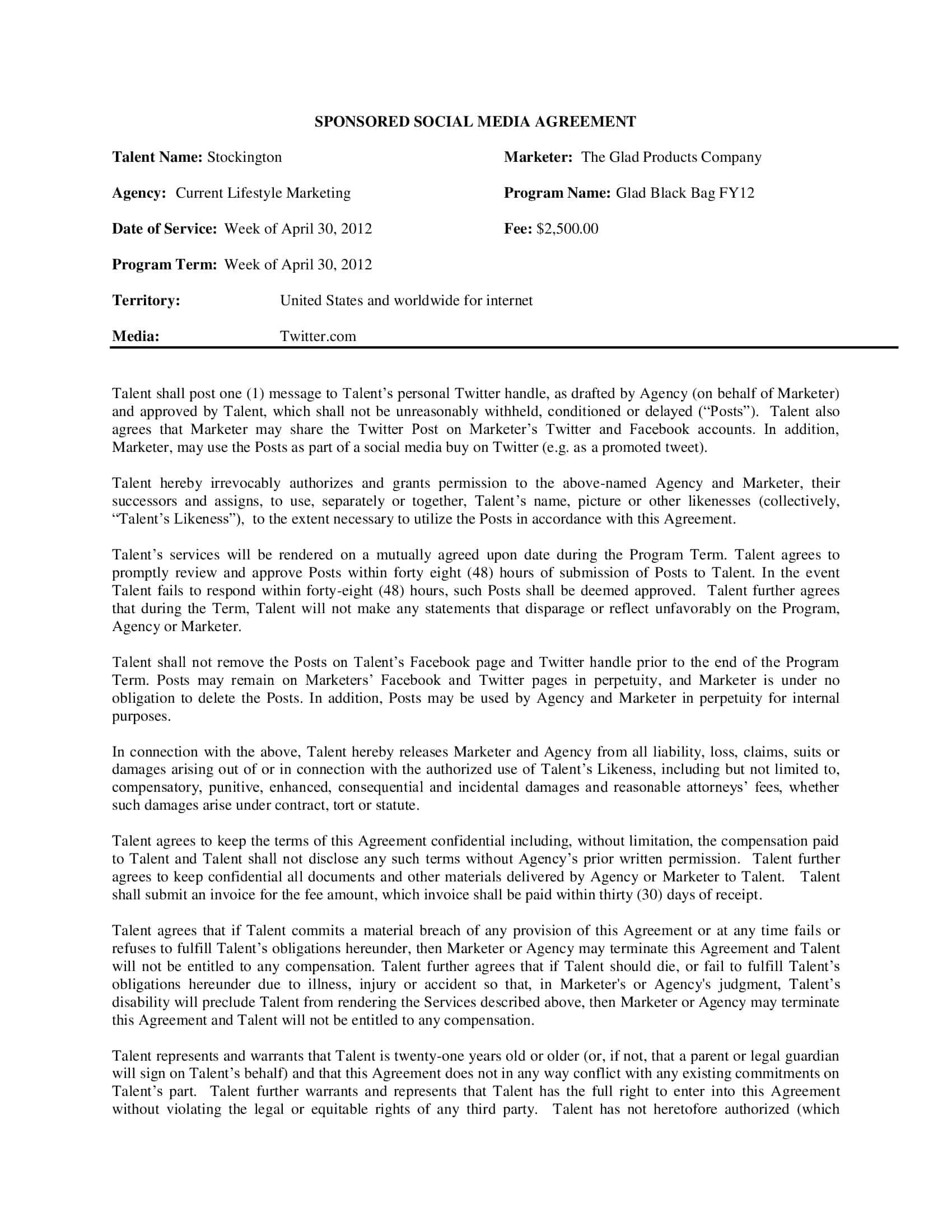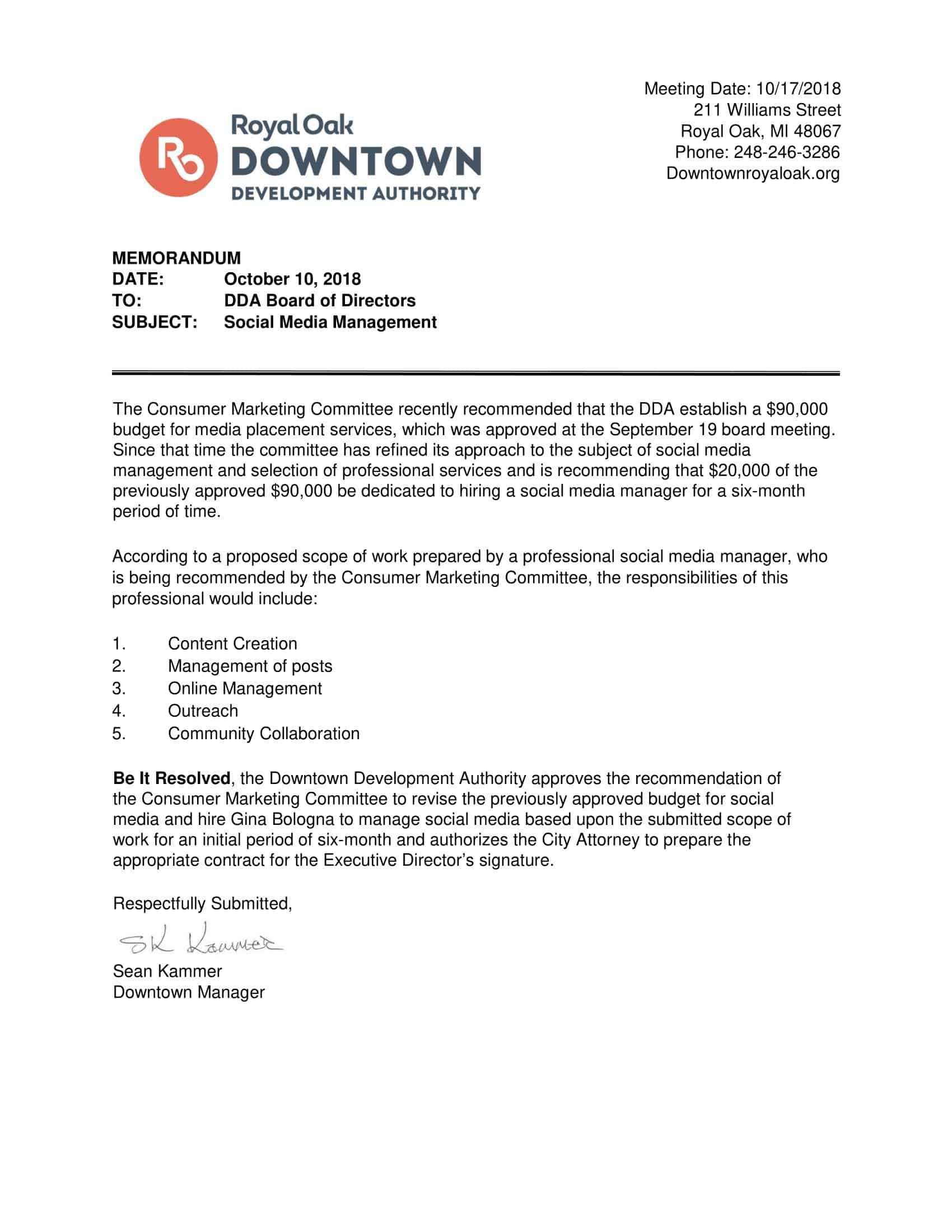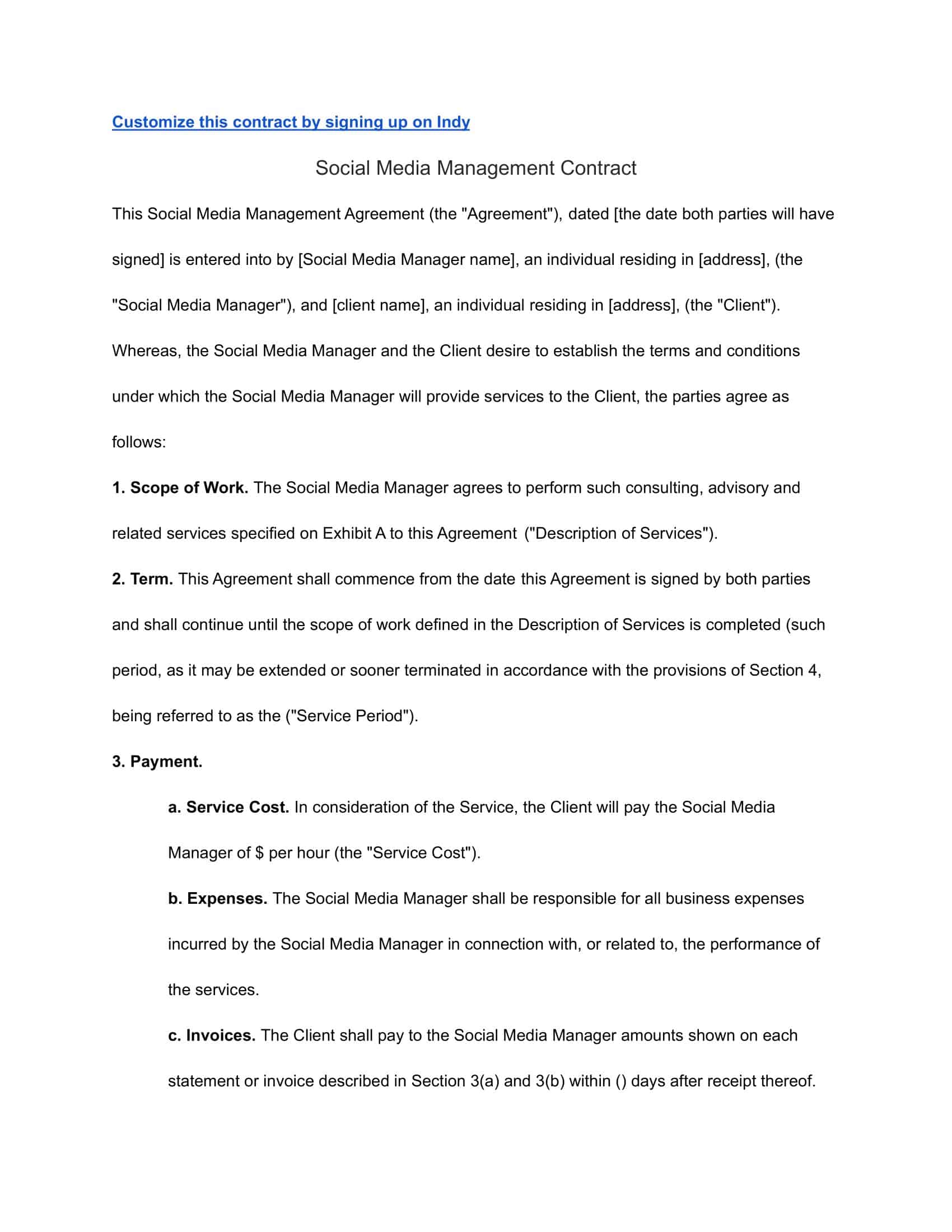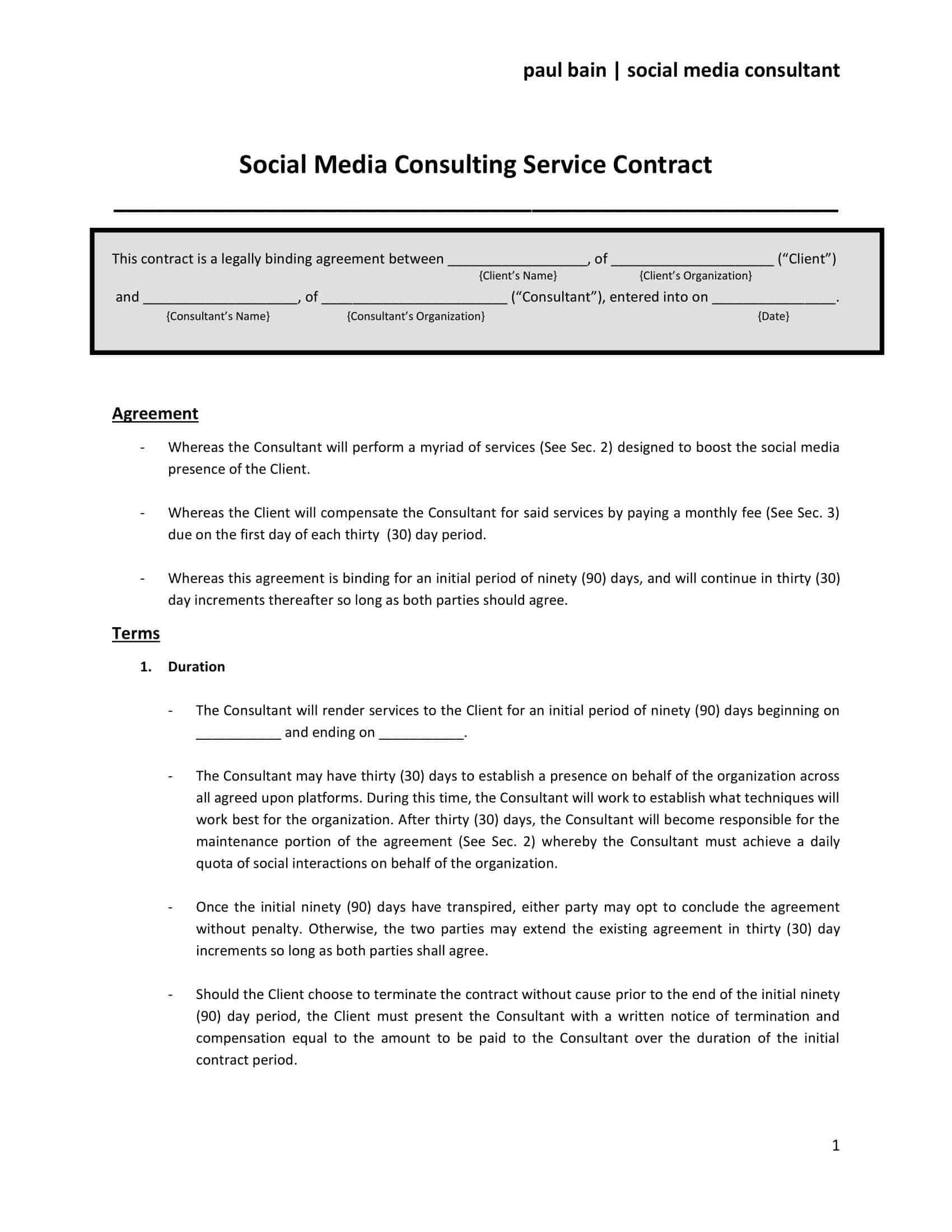Managing a brand’s online presence is a multifaceted task, requiring both strategy and diligence. An essential component to ensure this harmony is a robust Social Media Management Contract, a tool that defines responsibilities, sets expectations, and safeguards both parties.
As more businesses turn to social platforms to engage with their audience, this agreement becomes a linchpin for success. This article will explore the nuances of these contracts and provide valuable samples and templates to help you establish a solid foundation for your social media management endeavors.
Table of Contents
What Is a Social Media Management Contract?
![Free Printable Social Media Management Contract Templates [Word] 1 Social Media Management Contract](https://www.typecalendar.com/wp-content/uploads/2023/08/Social-Media-Management-Contract.jpg 1920w, https://www.typecalendar.com/wp-content/uploads/2023/08/Social-Media-Management-Contract-300x169.jpg 300w, https://www.typecalendar.com/wp-content/uploads/2023/08/Social-Media-Management-Contract-1024x576.jpg 1024w, https://www.typecalendar.com/wp-content/uploads/2023/08/Social-Media-Management-Contract-768x432.jpg 768w, https://www.typecalendar.com/wp-content/uploads/2023/08/Social-Media-Management-Contract-1536x864.jpg 1536w, https://www.typecalendar.com/wp-content/uploads/2023/08/Social-Media-Management-Contract-1200x675.jpg 1200w)
A Social Media Management Contract is a legally binding agreement between a business and a social media manager or agency, outlining the specific responsibilities, expectations, and terms of their collaboration.
It details essential elements such as the scope of work, deliverables, timelines, payment structure, confidentiality, intellectual property rights, and mechanisms for dispute resolution. By clearly defining these parameters, the contract ensures transparency and accountability, minimizing potential misunderstandings and fostering a positive, productive relationship between the parties involved.
Social Media Management Contract Templates
Social media is a crucial part of any modern business’s marketing strategy. Hiring a social media manager can help grow your brand and connect with customers online. A social media management contract outlines the services, deliverables, and terms that a manager will provide.
A social media management contract should specify the platforms that will be managed, such as Facebook, Instagram, Twitter, LinkedIn, and TikTok. It should state how many posts will be published per platform per week or month. The contract can list types of content like blogs, videos, images, stories, reels, and live videos. Analytics and reporting requirements should be included, like weekly or monthly summaries of engagement and follower growth.
The contract should also cover content creation services, if applicable. This may involve developing post templates that match brand guidelines. It can also include content ideation and writing original posts. The manager’s responsibilities around replying to comments, messages, and customer service inquiries on social platforms should be outlined. Fees for the agreed upon services, payment terms, contract length, and ownership of content should be clearly defined in the agreement templates.
What is a Social Media Manager?
A Social Media Manager is a professional responsible for representing a brand, company, or individual across various social media platforms. Their duties encompass creating, curating, and managing published content, engaging with the audience, analyzing performance metrics, and implementing strategies to enhance online presence.
By understanding the brand’s voice and goals, a Social Media Manager crafts targeted messages and campaigns that resonate with the audience, fostering community engagement, building brand awareness, and often contributing to sales and growth objectives. Their role is pivotal in connecting businesses with the digital world, leveraging the power of social media to create meaningful interactions and relationships.
Purpose of a social media management contract
The purpose of a Social Media Management Contract extends beyond a simple agreement between two parties. It’s a multifaceted tool designed to protect, guide, and define the relationship between a business and a social media manager or agency. Here’s a detailed breakdown of its key purposes:
Clear Definition of Responsibilities
The contract outlines the specific tasks, deliverables, and expectations for both parties. From content creation to reporting and analytics, every duty is detailed to prevent ambiguity.
Payment Structure and Terms
By clearly defining the payment terms, rates, schedules, and possible additional charges, the contract minimizes disagreements related to financial matters.
Timeline Management
The contract sets clear deadlines for milestones and deliverables, ensuring that projects stay on track and align with broader business goals.
Confidentiality and Intellectual Property Protection
It establishes rules for handling sensitive information, protecting both the intellectual property of the business and the proprietary methods of the social media manager.
Dispute Resolution Mechanism
In the event of disagreements or misunderstandings, the contract lays down the processes for resolution, potentially avoiding costly and time-consuming legal battles.
Quality Assurance
The contract can also define quality standards and performance metrics, ensuring that the services provided meet or exceed agreed-upon levels.
Termination Clauses
Clearly defined provisions for terminating the contract protect both parties. This includes outlining the reasons for possible termination and the notice period required.
Legal Compliance and Governance
It ensures that all practices adhere to relevant laws, regulations, and industry standards, helping both parties to navigate the legal landscape.
Relationship Definition
The contract stipulates the nature of the relationship between the parties, clarifying whether it’s a client-contractor relationship, employer-employee, or partnership, which can have different legal implications.
Marketing and Brand Alignment
The agreement often outlines how the brand’s identity should be represented, ensuring that messaging and visuals are consistent with overall brand guidelines.
Revisions and Alterations Process
It may detail how changes or revisions to the work or scope are handled, thus accommodating flexibility while maintaining structure.
Risk Mitigation
By addressing potential challenges and risks ahead of time, the contract serves as a risk mitigation tool, providing a roadmap for handling unexpected situations.
What should be included in a social media management contract?
Creating a Social Media Management Contract requires thoughtful consideration of various elements that protect and guide both parties. Here’s a very detailed guide on what should be included:
- Parties Involved: Clearly identify the client and the social media manager or agency, including contact information.
- Scope of Work: Detail the specific services to be provided, including content creation, community engagement, monitoring, advertising management, reporting, and more.
- Deliverables: Define exact deliverables, including the number of posts, type of content (e.g., video, blog), platforms to be used, and any other specific expectations.
- Payment Terms:
- Fees: Outline the fee structure, whether it’s hourly, monthly, or per project.
- Payment Schedule: Define when payments are due, such as upon completion or on a set date.
- Additional Costs: Include any potential extra costs, like advertising expenses or third-party tools.
- Timelines and Milestones: Provide a clear schedule with deadlines for tasks, project phases, or other relevant milestones.
- Quality Standards: Establish the quality criteria the work must meet, possibly linking to specific industry standards or internal guidelines.
- Revisions and Alterations: Outline the process for requesting changes to the work, including any related fees and how many revisions are allowed.
- Confidentiality Clause: Include terms to protect sensitive business information and trade secrets shared during the collaboration.
- Intellectual Property Rights: Clearly state who owns the intellectual property of the created content and any limitations on usage.
- Compliance with Laws and Regulations: Detail any legal or regulatory requirements that must be adhered to, such as privacy laws or advertising standards.
- Termination Clause:
- Reasons for Termination: Enumerate conditions under which the contract can be terminated by either party.
- Notice Period: Define the notice required for termination and any associated fees or penalties.
- Dispute Resolution: Specify the method for resolving disputes, whether through mediation, arbitration, or legal proceedings, and the jurisdiction governing the contract.
- Liability and Indemnification: Include clauses that define the extent of liability for both parties and conditions under which one party may be required to compensate the other.
- Marketing and Brand Guidelines: Attach or reference any guidelines that must be followed in representing the brand.
- Tools and Resources: If specific tools or resources are required for the job, include details and who is responsible for providing or paying for them.
- Reporting and Performance Metrics: Define the metrics to be used to measure success, and how and when reports will be delivered.
- Relationship Definition: Clearly define the relationship between the parties (e.g., independent contractor, not an employee) to avoid legal misunderstandings.
- Force Majeure: Include a clause to address unforeseen circumstances that may affect the ability to fulfill the contract, such as natural disasters.
- Entire Agreement and Amendment: State that the contract represents the entire agreement between the parties and the method by which it may be amended.
- Signatures: Ensure that both parties sign the contract, demonstrating acceptance of all terms.
How to Write a Social Media Management Contract?
Creating a social media management contract is an essential step in solidifying the expectations, terms, and conditions of a partnership between a social media manager and their client. It helps ensure both parties are on the same page and mitigates potential issues that might arise during the project. Here’s a detailed step-by-step guide:
Step 1: Identify the Parties and Introduction
Begin the contract by clearly defining who the agreement is between. Include the names, titles, and contact information for both the social media manager and the client.
Example: “This Agreement is made as of [Date], by and between [Your Full Legal Name], with a mailing address of [Your Address] (‘Manager’), and [Client’s Full Legal Name], with a mailing address of [Client’s Address] (‘Client’).”
Step 2: Outline the Scope of Services
Clearly describe the services you’ll provide, including content creation, managing accounts, responding to comments, etc. Mention any platforms that are part of the agreement.
Example: “The Manager will manage social media accounts on Facebook, Instagram, and Twitter, including content creation, posting three times a week, and monitoring comments and engagement.”
Step 3: Set the Payment Terms
Detail the payment terms, including the total amount, due dates, and accepted payment methods.
Example: “The Client will pay the Manager $5,000 in five monthly installments of $1,000, payable by bank transfer on the first of each month.”
Step 4: Determine the Duration and Termination
Include the start and end dates, any provisions for renewing the contract, and conditions for termination by either party.
Example: “This Agreement starts on [Start Date] and ends on [End Date]. Either party may terminate with 30 days’ notice, with a $500 termination fee payable by the Client.”
Step 5: Address Confidentiality and Intellectual Property
Include clauses about maintaining confidentiality and the ownership of intellectual property created during the contract.
Example: “All content created by the Manager is the property of the Client upon payment. Both parties agree to keep information related to the project confidential.”
Step 6: Include General Legal Provisions
Add general clauses that cover governing law, dispute resolution, waivers, amendments, and the entire agreement.
Example: “This Agreement is governed by [State/Country] law. Disputes will be resolved through arbitration. No changes to this Agreement are valid unless in writing and signed by both parties.”
Step 7: Closing and Signatures
Conclude with a closing statement, followed by spaces for signatures, names, titles, and dates for both parties.
Example: “IN WITNESS WHEREOF, the parties have executed this Social Media Management Agreement as of the Effective Date.”
[Your Name & Title] [Client’s Name & Title]
[Your Company Name, if applicable] [Client’s Company Name, if applicable]
Date: ___________________ Date: ___________________
What are the services of social media manager?
A social media manager plays a crucial role in shaping a brand’s online presence. They act as the voice of the company across social platforms and are responsible for creating, curating, and managing published content. Below is a detailed guide outlining the primary services offered by a social media manager:
1. Strategy Development
- Audience Analysis: Understanding the target audience, including their interests, behaviors, and preferences.
- Competitor Analysis: Studying competitors to understand their strengths, weaknesses, and social media tactics.
- Goal Setting: Defining clear and measurable objectives aligned with business goals.
- Content Strategy: Planning the type, tone, frequency, and timing of posts.
- Platform Selection: Identifying the most relevant social media channels for the brand.
2. Content Creation
- Graphics and Video Production: Creating engaging visual content like images, GIFs, videos, and infographics.
- Copywriting: Crafting compelling messages, captions, and headlines.
- Content Calendar: Planning and scheduling content in advance.
3. Community Management
- Engagement: Responding to comments, messages, and engaging with the audience to foster a sense of community.
- Monitoring: Watching for mentions and relevant conversations across platforms.
- Crisis Management: Handling negative comments or public relations issues professionally.
4. Advertising and Promotion
- Ad Campaigns: Creating and managing paid advertising campaigns to boost reach and conversions.
- Influencer Marketing: Collaborating with influencers to extend brand reach.
- Promotions and Contests: Designing and managing promotions, giveaways, or contests to engage the audience.
5. Analytics and Reporting
- Performance Tracking: Monitoring metrics such as engagement, reach, followers, likes, and shares.
- ROI Analysis: Assessing the return on investment for social media campaigns.
- Reporting: Creating regular reports to provide insights and recommendations.
6. Compliance and Best Practices
- Platform Guidelines: Ensuring that all activities comply with social media platform rules and regulations.
- Brand Guidelines: Adhering to the company’s brand voice, style, and ethics.
7. Collaboration and Coordination
- Inter-Departmental Collaboration: Working closely with marketing, sales, customer service, and other departments to ensure alignment.
- Vendor Management: Collaborating with external vendors like graphic designers or advertising agencies.
8. Continuous Learning and Development
- Trend Monitoring: Keeping up-to-date with the latest social media trends and algorithm changes.
- Skills Development: Regularly updating skills through workshops, courses, or self-learning.
How Much to Charge for Social Media Management
Social media management has become an essential part of modern business, and professionals in this field offer diverse services that require various skills and effort levels. As a social media manager, determining what to charge can be a complex task, dependent on numerous variables such as the nature of the services, experience level, client’s needs, geographic location, and more. In this part, we’ll delve into these factors and provide specific guidance on hourly rates across the US, UK, Australia, Canada, and Europe.
Conditions Affecting Pricing
- Scope of Services: From content creation to community engagement, the range and complexity of services affect pricing.
- Experience and Skills: Your expertise, certifications, and past success can justify higher rates.
- Client’s Industry and Size: Different industries and business sizes have varying needs and budgets.
- Geographic Location: Local market rates and cost of living influence what you can charge.
- Expenses: Additional costs, such as tools or advertising, should be considered.
- Value Proposition: How you communicate and deliver value can make a difference in what clients are willing to pay.
Hourly Rates by Region
Understanding the local market is crucial, as it shapes the expectations and budgets of potential clients. Here are indicative hourly rates for different experience levels in various regions:
United States (USD)
- Entry-Level: $15 – $30 per hour, suitable for those starting and building a portfolio.
- Intermediate Level: $30 – $60 per hour, typically for those with some experience and a proven track record.
- Expert Level: $60 – $150+ per hour, for highly specialized and experienced professionals.
United Kingdom (GBP)
- Entry-Level: £10 – £20 per hour, often for new entrants into the field.
- Intermediate Level: £20 – £40 per hour, reflecting greater expertise and market positioning.
- Expert Level: £40 – £100+ per hour, for top-tier professionals with in-depth knowledge.
Australia (AUD)
- Entry-Level: A$20 – A$40 per hour, catering to smaller clients or those new to the profession.
- Intermediate Level: A$40 – A$80 per hour, reflecting a solid skill set and client base.
- Expert Level: A$80 – A$200+ per hour, for those providing specialized services.
Canada (CAD)
- Entry-Level: C$15 – C$30 per hour, often for general social media management tasks.
- Intermediate Level: C$30 – C$60 per hour, for those with experience and specialized skills.
- Expert Level: C$60 – C$150+ per hour, reflecting top-level expertise and niche specialization.
Europe (EUR)
- Entry-Level: €10 – €20 per hour, suitable for basic social media management.
- Intermediate Level: €20 – €50 per hour, reflecting increased expertise and market recognition.
- Expert Level: €50 – €120+ per hour, for those at the top of the field, offering specialized services.
FAQs
Why Do I Need a Social Media Management Contract?
A social media management contract clarifies the expectations and responsibilities of both parties, reducing the risk of misunderstandings or disputes. It legally binds both parties to the terms and provides a clear framework for the services, payment, timelines, and other essential aspects of the project.
Can I Terminate a Social Media Management Contract Early?
Most contracts include a termination clause that defines the conditions under which the contract can be ended early by either party. This typically includes a notice period and may involve penalties or fees. The specific terms should be outlined in the contract itself.
Who Owns the Content Created Under a Social Media Management Contract?
Ownership of content created under a social media management contract is typically defined within the contract itself. Often, the client owns the content once it has been paid for, but this can vary, so it’s essential to clarify this aspect in the contract.
Is a Social Media Management Contract Legally Binding?
Yes, a social media management contract is a legally binding agreement. Both parties are obligated to fulfill the terms as outlined in the contract. Failure to do so could result in legal consequences.
Can I Modify a Social Media Management Contract After Signing?
Changes to a social media management contract after signing typically require the written consent of both parties. Many contracts include an amendment clause that outlines the process for making changes to the agreement.
How Can I Ensure My Social Media Management Contract Is Legally Sound?
To ensure that a social media management contract complies with all relevant laws and regulations, it’s advisable to consult with a legal professional. They can review and tailor the contract to fit the specific situation and jurisdiction.


























![Free Printable Land Contract Templates [Word, PDF] Simple 2 Land Contract](https://www.typecalendar.com/wp-content/uploads/2023/05/Land-Contract-1-150x150.jpg)
![Free Printable Catering Contract Templates [Word, PDF] Simple 3 Catering Contract](https://www.typecalendar.com/wp-content/uploads/2023/05/Catering-Contract-1-150x150.jpg)
![Free Printable DJ Contract Templates [Word, PDF] Simple 4 DJ Contract](https://www.typecalendar.com/wp-content/uploads/2023/05/DJ-Contract-1-150x150.jpg)
